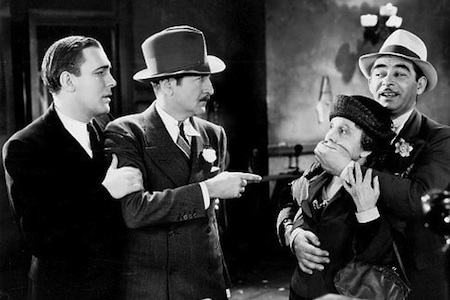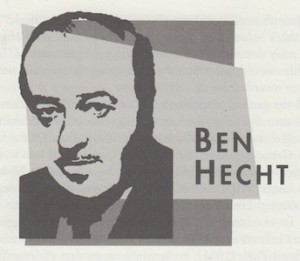Born: February 28, 1894, New York, NY
Died: April 18, 1964, New York, NY
With the advent of sound, studios scrambled to recruit ‘real’ writers.
—Peter Hay
Ben Hecht began his writing career in 1914 as a WWI reporter for the Chicago Daily News, stationed in Berlin. He was the first foreign correspondent there after Germany’s military defeat, and his insightful observations were delivered in a choppy, smart style that came to exemplify Chicago journalism. Upon his return from the war, he started a daily human interest column for the Daily News and developed a reputation as one of the trade’s best writers. He was intensely passionate about politics and wrote opinion pieces on all international matters.
The Film 100
1. W.K. Laurie Dickson
2 Edwin S. Porter
3. Charlie Chaplin
4. Mary Pickford
5. Orson Welles
6. Alfred Hitchcock
7. Walt Disney
8. D.W. Griffith
9. Will Hays
10 Thomas Edison
11. John Wayne
12. J.R. Bray
13. Billy Bitzer
14. Jesse Lasky
15. George Eastman
16. Sergei Eisenstein
17. André Bazin
18. Irving Thalberg
19. Thomas Ince
20. Marlon Brando
21. Louis B. Mayer
22. Greta Garbo
23. Robert Flaherty
24. Lon Chaney
25. Anita Loos
26. George Méliès
27. Adolph Zukor
28. John Gilbert
29. Max Fleischer
30. John Ford
31. William Fox
32. George Lucas
33. Linwood Gale Dunn
34. Eadweard Muybridge
35. Katharine Hepburn
36. Winsor McCay
37. Stanley Kubrick
38. Buster Keaton
39. James Agee
40. Fritz Lang
41. Marcus Loew
42. Cedric Gibbons
43. James Cagney
44. Ben Hecht
45. Ingmar Bergman
46. Humphrey Bogart
47. Leon Schlesinger
48. Louella Parsons
49. Roger Corman
50. Edith Head
51. Bernard Herrmann
52. Gary Cooper
53. Mike Todd
54. Ernst Lubitsch
55. Sidney Poitier
56. Saul Bass
57. Billy Wilder
58. Bette Davis
59. Erich von Stroheim
60. Max Factor
61. Auguste and Louis Lumière
62. Woody Allen
63. Clark Gable
64. David O. Selznick
65. Gregg Toland
66. Lillian Gish
67. William Cameron Menzies
68. Lucille Ball
69. Samuel Rothafel
70. Akira Kurosawa
71. Marilyn Monroe
72. Vittorio De Sica
73. Natalie Kalmus
74. Gene Siskel and Roger Ebert
75. Willis O’Brien
76. Shirley Temple
77. Yakima Canutt
78. Sam Peckinpah
79. Jackie Coogan
80. Federico Fellini
81. Leni Riefenstahl
82. Steven Spielberg
83. Sam Warner
84. Jean-Luc Godard
85. Robert De Niro
86. Fred Astaire
87. Francis Ford Coppola
88. Ted Turner
89. Clint Eastwood
90. Dalton Trumbo
91. Dennis Hopper
92. Richard Hollingshead
93. Melvin Van Peebles
94. John Chambers
95. Mack Sennett
96. Martin Scorsese
97. Karl Struss
98. Busby Berkeley
99. John Hubley
100. John Cassavetes
Hecht’s close association with radical novelists and poets made him a key figure on the Chicago literary scene of 1922. He began writing pieces that espoused socialist views, and his first novel was deemed “obscene” and “dangerous” by the U.S. government; the entire printing was seized and burned. Under a cloud of suspicion among his colleagues and employers, Hecht was discharged from his position on the Daily News. He packed up and moved to New York, intent on becoming a playwright.
Hecht became a regular face at the Algonquin Hotel, a hangout for famous New Yorker magazine contributors and figures of the publishing and theater districts. His close friend Herman Mankiewicz suggested Hecht try his hand at screenwriting and enticed him to Hollywood in 1925.
Director Josef von Sternberg shared the cynical attitude Hecht had toward America’s values and Hollywood’s decadence, and together they worked on a story that would become the first gangster drama, Underworld (1927). The film would boost Sternberg’s sagging career and win Hecht the first Oscar ever awarded for an original story.
Hecht had the perfect disposition for a writer working within the studio system of the sound era; he liked anonymity and actually disdained screenwriting, making it clear that he only did it for the money. Of the sixty movies he wrote, he claimed to have written more than half in two weeks or less. When he wasn’t required to be in Hollywood, he retreated to New York. This improved his image in the eyes of the writer-snobs of the Algonquin Round Table, who counted Hecht among their extended family. Their respect for Hecht had far-reaching implications. When Hecht dragged Charles MacArthur to Hollywood in 1928 to write the film version of their Broadway smash The Front Page (1931), he sparked an exodus of New York’s finest writers. Soon, the top literary talent on the East Coast headed west: Dorothy Parker, Robert Benchley, Marc Connelly, George S. Kaufman, Robert Sherwood and Moss Hart, and others were close behind them.
For the next forty-two years, Hecht wrote scripts for classic pictures, including Queen Christina (1933), Gunga Din (1938), Wuthering Heights (1939) and Duel in the Sun (1946). He worked easily in any genre, tackling them all, but his gift for satire made for a strong series of outlandish farces and screwball comedies, among them Twentieth Century (1934), and the Marx Brothers’ At the Circus (1939).
Besides The Front Page and Foreign Correspondent (1940), directed by Alfred Hitchcock, Hecht wrote another cult favorite among budding journalists, Nothing Sacred (1937), starring Fredric March and Carole Lombard. The screwball plot provided a biting look at the ethical responsibility of the media.
Film noir thrillers were another specialty of Hecht’s. He and MacArthur wrote Crime Without Passion (1934), a powerful crime horror film starring Claude Rains as a demonic lawyer on a killing spree that is still a late-night classics, and Kiss of Death (1947), in which a psychopathic hitman (Richard Widmark) hunts a small-time jewel thief about to inform on the mob, left a permanent impression. Widmark’s crazy delivery of Hecht’s lines sparkles as he interrogates the crook’s mother: “I’m askin’ ya, where’s that squealin’ son of yours? You think a squealer can get away from me? Huh? You know what I do to squealers? I let ‘em have it in the belly, so they can roll around for a long time thinkin’ it over.”
He also became Hollywood’s busiest script doctor. David O. Selznick trusted his judgment implicitly, once calling him in desperation and offering $15,000 for some anonymous fixes to Gone with the Wind (1939), including the classic “frankly, my dear” addition. Hitchcock religiously passed scenarios under Hecht’s nose and used him to script Spellbound (1945), Notorious (1946) and The Paradine Case (1947). As a favored writer of Irving Thalberg, Hecht facetiously coined the term “treatment” for the way the young producer doctored his scripts.
Hecht was seldom concerned about receiving screen credit and often worked without recognition. The top directors of the age consulted him discreetly for his much-needed help on their scripts: Howard Hawks, Rouben Mamoulian, Otto Preminger, William Wellman, Howard Hughes, Orson Welles and John Ford are just a few. In fact, Hecht was a ghostwriter on the memorable lines of Rita Hayworth in Gilda (1946), Danny Kaye in The Inspector General (1949), Gregory Peck in Roman Holiday (1953) and Frank Sinatra in The Man with the Golden Arm (1955).
Ben Hecht legitimized screenwriting to the entire literary world. His success, both financially and artistically, made it comfortable for other writers to come to Hollywood, and his skill put screenwriters on an equal ground with directors as the architects of motion picture storytelling. He rests comfortably in the ranking between Anita Loos and Dalton Trumbo, and together their influences can be felt in the vast majority of screenplays written today.
To read all the republished articles from ‘The Film 100,’ go to Reintroducing the Film 100 here on Keyframe.





